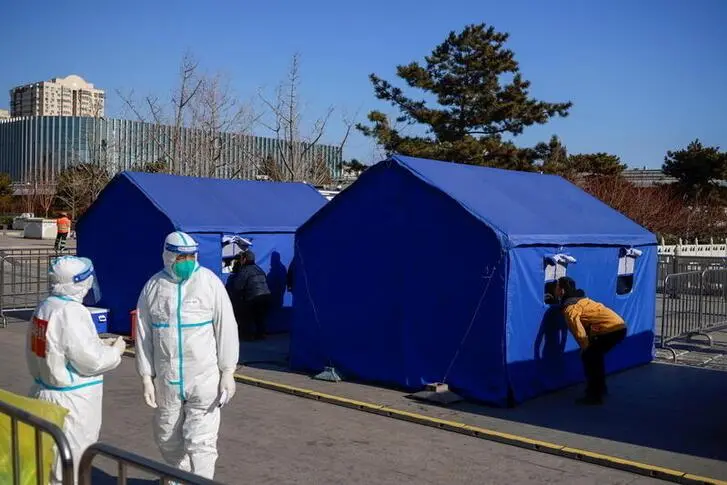PHOTO
BEIJING - China reported more than 100 new COVID-19 cases for the sixth consecutive day, with rising infections in the northeast fuelling concerns of another national wave when hundreds of millions travel for the Chinese Lunar New Year holiday.
Tough new controls in the city of Gongzhuling in Jilin province, which has a population of around 1 million people, brings the total number of people under lockdown to more than 29 million.
According to the Global Times newspaper, at least 11 regions in the three provinces of Hebei, Heilongjiang and Jilin have now imposed de facto lockdowns and rolled out extensive testing programmes.
The National Health Commission reported 109 new COVID-19 cases for Jan. 17, unchanged from a day earlier. Of the 93 local infections, 54 were reported in Hebei, which surrounds Beijing.
Northeastern Jilin province also reported a record 30 new cases, underscoring the risk of new clusters emerging.
Daily increases still remain a fraction of what the country saw at the height of the outbreak in early 2020, but officials are concerned infections could spread rapidly nationwide during China's Lunar New Year holiday in less than a month.
Despite travel restrictions, the China Railway Corporation expects around 296 million railway passenger trips during the Lunar New Year break, compared with 410 million in 2019.
Shanghai is one of many cities providing financial incentives for migrant workers not to travel home.
China's statistics bureau chief Ning Jizhe said on Monday that the overall impact of the current COVID-19 resurgence on the country's economy remained controllable.
But though the official Xinhua news agency warned in a commentary that local governments should not "cry wolf", many have been introducing a series of fresh curbs.
Beijing, which reported two new local infections, will begin requiring travellers from abroad to undergo health monitoring for seven additional days following 21 days of medical observation, Xinhua reported on Saturday.
The city of Gongzhuling said on Monday that it is "strictly forbidden" for anyone to go out unless they are scheduled to get a COVID-19 test at a designated site.
The outbreak in Jilin is believed to have been caused by an infected salesman travelling to and from the neighbouring province of Heilongjiang, the site of a previous cluster of cases.
Xinhua said in a commentary piece on Monday that the new clusters of infection were caused by social activities in rural areas and a lack of awareness at the grassroots level, creating "hotbeds" for the virus's rapid spread.
The total number of confirmed COVID-19 cases in mainland China is 89,336, while the death toll remained unchanged at 4,635. The data excludes cases from Macau and Hong Kong, which are Chinese cities but report new cases independently, and self-ruled Taiwan which China claims as its own.
World Health Organization (WHO) representatives said on Friday that its investigation team in China have begun discussions with their Chinese counterparts via video conference as they remain in quarantine.
(Reporting by Beijing and Shanghai newsrooms; additional reporting by Stephanie Nebehay in Geneva; Writing by Se Young Lee and David Stanway; Editing by Christian Schmollinger, Michael Perry and Raju Gopalakrishnan) ((vincentsy.lee@thomsonreuters.com; follow me on Twitter @Rover829;))





















